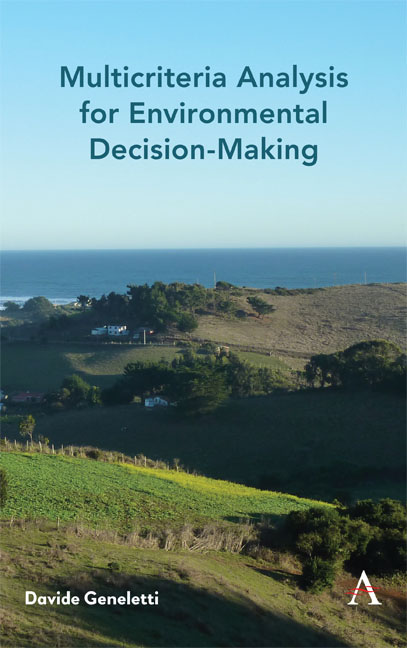Book contents
- Frontmatter
- Contents
- List of Figures
- List of Tables
- Acknowledgements
- List of Author and Contributors
- Introduction
- 1 Principles of Multicriteria Analysis
- 2 A Review of MCA Applications for Nature Conservation
- 3 Landfill Site Selection: Combining Spatial MCA with Stakeholder Analysis
- 4 Protected Area Zoning: Integrating Spatial MCA and Multi-objective Evaluation
- 5 Forest Landscape Restoration: Applying MCA to Design and Compare Options
- 6 Impact Assessment of Ski Areas: Combining GIS Indicators with MCA
- Conclusions
- Annex
- References
- Index
- Frontmatter
- Contents
- List of Figures
- List of Tables
- Acknowledgements
- List of Author and Contributors
- Introduction
- 1 Principles of Multicriteria Analysis
- 2 A Review of MCA Applications for Nature Conservation
- 3 Landfill Site Selection: Combining Spatial MCA with Stakeholder Analysis
- 4 Protected Area Zoning: Integrating Spatial MCA and Multi-objective Evaluation
- 5 Forest Landscape Restoration: Applying MCA to Design and Compare Options
- 6 Impact Assessment of Ski Areas: Combining GIS Indicators with MCA
- Conclusions
- Annex
- References
- Index
Summary
Environmental decisions involve biophysical, sociocultural and economic issues, whose understanding necessitates appropriate methods of knowledge synthesis and stakeholder engagement, as well as the capability to handle increasingly complex and large data sets. It can be argued that all environmental decision-making processes need to consider and compare some forms of alternatives. Alternatives include all types of options, choices or courses of action to accomplish particular goals (Steinemann 2001). These alternatives can be related, for example, to ‘different possible purposes, different locations and design, different general approaches to serving the selected purpose, different locations and designs, different packages of mitigation and enhancement components, ad different implementation plans’ (Gibson et al. 2005, 126). In environmental decisions, alternatives are assessed against multiple and competing goals, such as protecting nature, addressing needs of communities and fostering economic growth.
Multicriteria analysis (MCA) is an effective knowledge synthesis method that supports decision-making by systematically exploring the pros and cons of different alternatives (Linkov and Moberg 2012; Geneletti and Ferretti 2015), and unveiling trade-offs. It allows comparing alternatives against a set of explicitly defined criteria that account for the most relevant aspects in a given decision-making process. Operationally, MCA supports structuring decision problems, assessing the performance of alternatives across criteria, exploring trade-offs, formulating a decision and testing its robustness. MCA is particularly useful when reducing a multi-objective problem into a single-objective problem is either unfeasible or undesirable, especially in participatory settings involving diverse stakeholders with diverse objectives (Linkov et al. 2006). Criteria can be incommensurable, and expressed through different units of measurement: monetary values, number of new jobs, biophysical units, qualitative evaluations and so on.
The main strength of MCA is that it allows combining the analytical performance of the alternatives with the preferences and priorities of stakeholders in a transparent and replicable fashion (French et al. 2009). For these reasons, MCA has been increasingly used in environmental decision-making to support the identification of suitable courses of action, by integrating factual information coming, for example, from field surveys or impact modelling, with valuebased information collected through stakeholder engagement (e.g. Nordström et al. 2011).
- Type
- Chapter
- Information
- Publisher: Anthem PressPrint publication year: 2019



